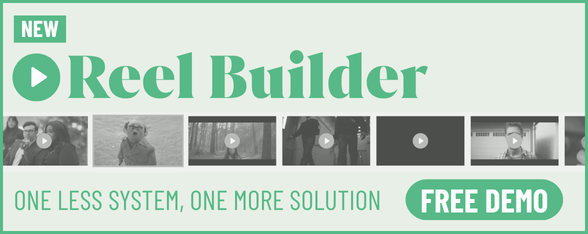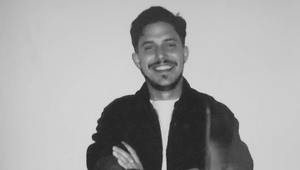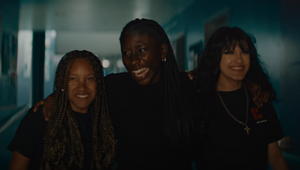
Creativity Squared: Feeding The Fire with Gilles Boisselet

Gilles Boisselet is a creative entrepreneur and executive creative director who has built his career in advertising and communication. As executive creative director, creative strategy officer, and creative partner at UNIT9, he has utilised the power of fusing art and technology to create innovative communication concepts for major global brands and companies including Lionsgate, Verizon and Netflix.
Over the last seven years, Gilles has created and led a number of UNIT9 divisions across digital engineering, game design, VR and experiential, helping the production studio boost its multidisciplinary creative services.
Person: What kind of creative person are you?
Giles> I wake up in the morning like a dog, happy and willing to make the most of the day. The sun is my clock, the cornerstone of routine, my perpetual opportunity. I used to do coffee and cigarettes but now I’m more green tea and sunrise. Even after some caffeine, I’m mostly introverted. However, I would say I’m an introextrovert ++, which means my core balance is introvert, but when I do stuff, I always do it with passion, whatever it takes. I can quickly become more extroverted than an extrovert.
I spend most of my time thinking; my brain is my hammer, my axe, and my pencil. Anything needed to create. I believe creativity comes from inside - it’s an energy, a fire that you feed and grow. The bigger, the better. I love eating the world. Anything. Arts, tech, music, philosophy, scrolling, doesn't really matter. You can learn from anything; you just need to look at it and touch it like a kid.
Everything is up for grabs as material for metaphors and analogy, the meaningful big brain collages. No need to worry about missing out; you don’t know what you miss anyway.
Creativity comes from inside, but to materialise it needs to be a performance. A canvas, a stage, a sentence. That’s where work takes off. You need to shape this raw energy to make something from it. A performance you can share with people to enjoy. This is what should drive creativity; if you don’t crave to share your work to an audience, it’s not good enough.
Product: How do you judge the creativity of a piece of work?
Giles> A great creative work is a piece that meets its audience or successfully creates its own audience. For example, street art's best potential achievement is to extend the space and become a part of it.
Your audience will give you just one glance - and if you manage to catch it, you did the job. Simple. It doesn’t really matter if it’s good or not. What was good yesterday can be rubbish today; what was considered rubbish before can be amazing now. Impressionism, Pop Art, Rap, you name it. This is not our job as creatives to judge or understand. Our job is to make things. If you are good at it, you will just do that.
My favourite campaigns are the ones where we can see or materialise the audience.
I started working in digital and, unfortunately, in the beginning, the audience was just an anonymous cookie. Now, with events and streaming, you can actually see people enjoying the work. And it’s a virtuous circle: the more you see the audience, the more you want to perform better for them.
A good creative job is one that becomes a form of entertainment. In the end, we all fight for people's attention - entertainment and gamification are universal languages giving us the ability to start and develop conversations with people. The current creative landscape is full of fears and frustrations. AI, influence, politics. The projects that will succeed will be the ones focusing on their audience. Nothing else should exist as a creative. You can’t wash your brain, so don't pollute it.
Process: Tell us about how you like to make creative work
Giles> I like starting a creative job framing the deliverables. I'm a very practical artisan; I need to understand if I have to create a katana for revenge like in Kill Bill or sort out a bicycle to bring E.T back home. I love to start understanding the cultural or emotional motivators of the brand or the project. This is the alphabet to talk to people.
I believe in respect as a form of productivity. You can't succeed or create anything good if you don't believe in the brand and people. Keep your bias at the door and empower your team. In the past, competition was a primitive attempt to create quality. You put two guys against each other, and you get the result. The result is 20% of one of the guys. One lost, and 80% of the talent of the winner was wasted fighting. Now, it’s about making the most of collaboration.
Then feedback. You can gauge how powerful and how relevant you are in winning the target audience.
For example, you can use a sample of brand followers to test a prototype. It’s not about doing a collective workshop, it’s about doing a proof of concept or a proof of fun. With clients, I like to use a system to structure the delivery. If you deliver too early, you may be misunderstood; if you deliver too late, you will frustrate everyone. You need to find the right pace for everybody to enjoy and jump in. I love deadlines. Whatever you do in the creative field, you never finish; you just stop. Deadlines are your friends.
Press: What external factors have shaped you and what can make or break a creative project?
Giles> As creative, you are the sum of your experiences. This is not always a rational path - your best job can be cancelled because of a terrorist attack or a global financial downturn. However, you should try to put as many odds in your favour. If your creative interest is entertainment, you must go to LA even if you do not know what to do. You need to develop your own exposure to develop your skills and create the opportunities.
I grew up in the countryside, and the great thing was there was nothing to do, so you had to create your own entertainment.
You can more or less try anything, you can drive without a driving licence, build a cabana with a chainsaw, draw the landscape or your cat. You can create workflows or mini factories. Learn by doing. I love creating adrenaline in working, building up my own energy from the output of the creative work. Making fire but like water. If there is a path I will find it, if there is a barrage I will go over it, it’s just a matter of time.
A psychologist will tell you that you can sublime your frustrations. We seem pretty far away from creative tasks and deliverables. However, it’s the same world. Agencies can leverage this creative potential to understand and provide the right exposure for creatives. The right exposure provides the best results because you don't waste energy. The less pollution you have in your mind, the more focus you have on the product. There is no need to do meetings every 30 minutes, reshare everything on Slack every single second.
This doesn't exist.
Like we say in the cinema industry: you need to put the money on the screen.















